
Red Spider Lily Meaning in the Language of Flowers Petal Republic
Etymological meaning The red spider's lily's common name refers to the flower's appearance and tendency to bloom after exceptionally hard rains. Its scientific names come from two ancient words. Lycoris is ancient Greek for "twilight." Radiata is Latin for "to beam" or "to shine."
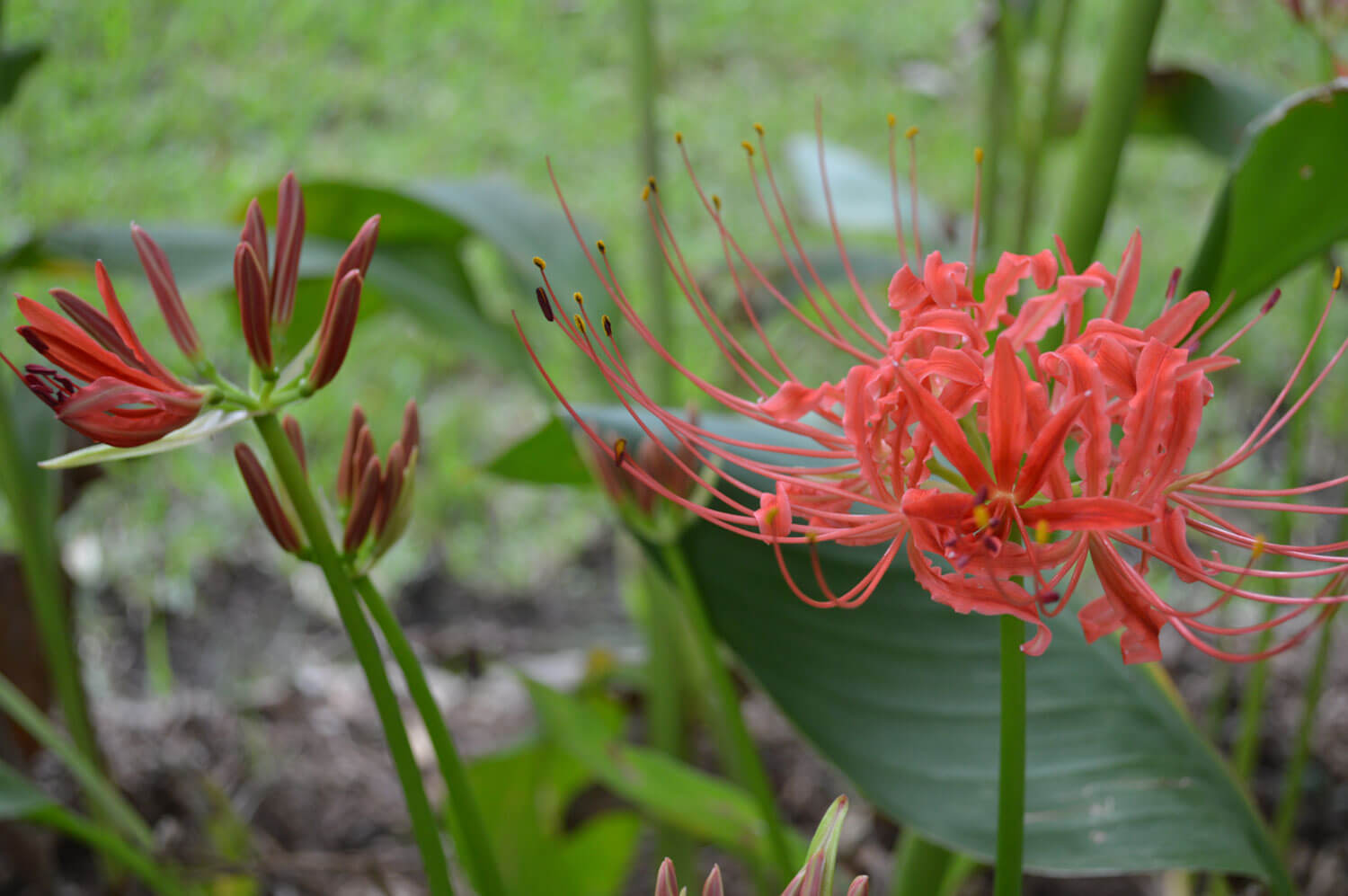
Red Spider Lilies Lycoris radiata
The red spider lily has many aliases; they are Spider Lily, Naked Lily, and Red Spider Lily. The red spider lily should be planted in a full-sun environment. It will bloom in late summer and be around 60-70 cm tall. The leaves remain green all winter long and at the first hint of warm weather the following spring, they will die. The Lycoris radiata is a perennial plant.

Lycoris radiata (Red Spider Lily) Bulb Jackson & Perkins
The red spider lily flower, also known as lycoris radiata, is a unique and captivating flower that has captured the attention of many. Its striking red color and spider-like shape make it stand out from other flowers, but what many people do not know is that it also has a rich history of symbolism and spiritual significance.
/growing-spider-lilies-lycoris-5111318-hero-284f9505e3d0419e89f24d87199992d2.jpg)
How to Grow and Care for the Spider Lily
Botanical Name: Lycoris spp. Common Name: Spider lily, hurricane lily, cluster amaryllis, naked lily, surprise lily Family: Amaryllidaceae family Plant Type: Perennial, bulb Hardiness Zones: 6 - 10 (USDA) Sun Exposure: Full, partial Soil Type: Well-drained Soil pH: Acidic, neutral, alkaline Height: 1-2 ft. tall Bloom Time: Summer, fall
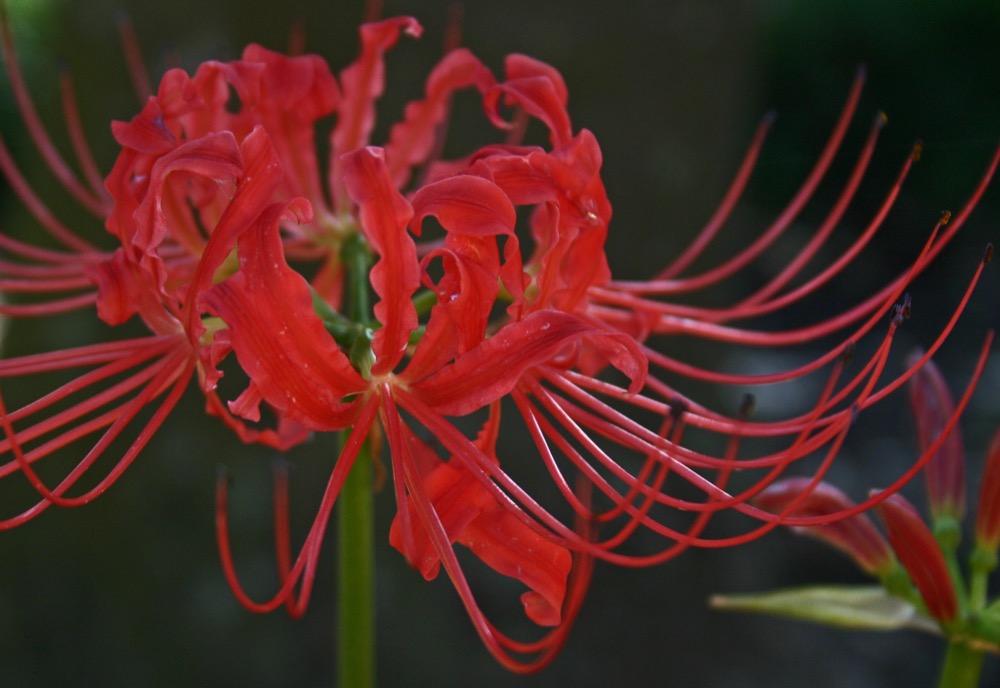
Lycoris Red Spider Lily The Garden Club of Houston
Lycoris radiata, known as the red spider lily, red magic lily, corpse flower, or equinox flower, is a plant in the amaryllis family, Amaryllidaceae, subfamily Amaryllidoideae. [3] Originally from China, Japan, Korea and Nepal [1] and from there to the United States and elsewhere.

Red Lycoris Radiata Red Surprise Lily Red Magic Lily Red Spider Lily Easy To Grow Bulbs
red spider lily. A bulbous perennial producing umbels of 4-6 bright red, late-summer flowers with wavy-margined, reflexed petals and conspicuous anthers. Strap-shaped, dark green, semi-erect leaves appear after flowering and persist through the winter into early spring. Synonyms. Nerine japonica.
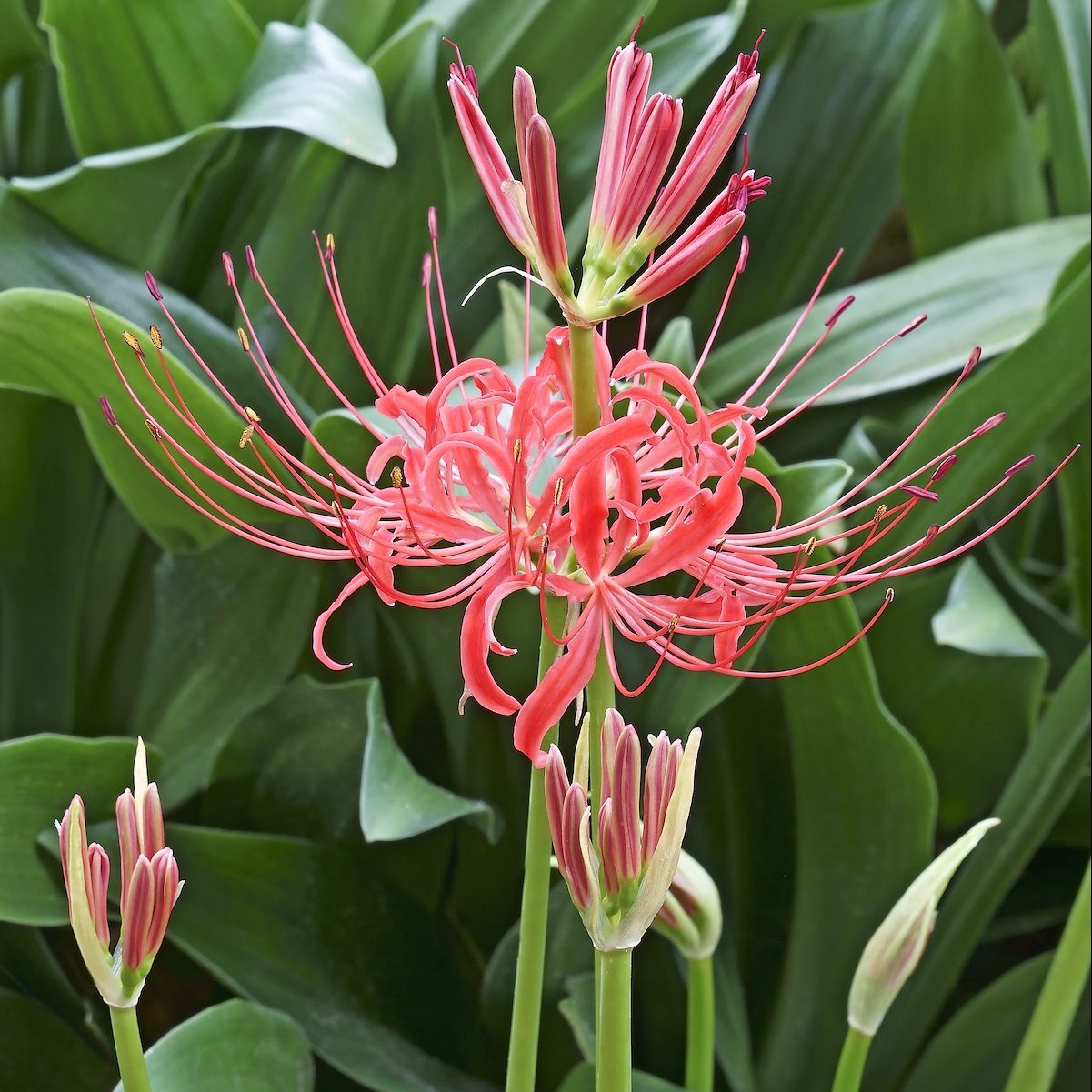
Heirloom Red Spider Lily (Lycoris Radiata) Bulbs, Fall Blooming Perennial, Perfect For Southern
Lycoris radiata, commonly known as Red Spider Lily or Hurricane Lily, is a bulbous perennial that is cherished for its late summer to early fall blooms. Lycoris radiata picture by houroumono; CC. Be aware that this plant also has the names of the Death flower and the Corpse flower.

Red Spider Lily Bulbs For Sale Lycoris Red Radiata Easy To Grow Bulbs
Perfect for the late summer garden, Lycoris radiata (Red Spider Lily) is a bulbous perennial boasting eye-catching umbels of 4-6 brilliant coral-red flowers with a golden sheen, adorned with elegantly curled petals and exceptionally long stamens. Blooming in late summer to early fall, the blossoms appear on naked stems.
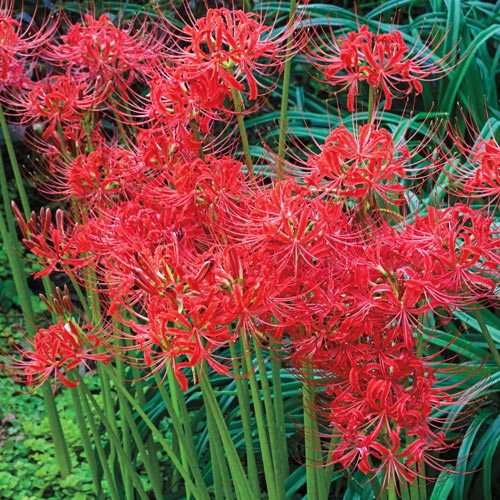
Lycoris radiata (Red Spider Lily) K. van Bourgondien
The red spider lily or lycoris radiata, is a bulbous perennial flower that is known for its stunning coral red clustered flowers with a golden sheen that are enveloped by long red stamens. The red spider lily is known by a number of names, including red magic lily, red surprise lily, hurricane lily, hell flower or equinox flower..

Red Lycoris Radiata Red Surprise Lily Red Magic Lily Red Spider Lily Easy To Grow Bulbs
Lycoris, commonly known as surprise lilies, spider lilies, or resurrection lilies, is a genus of flowering plants in the Amaryllis family, Amaryllidaceae. They are native to eastern and southern Asia, with the majority of species found in China and Japan. Description: Lycoris are perennial bulbs prized for their showy, funnel-shaped flowers.
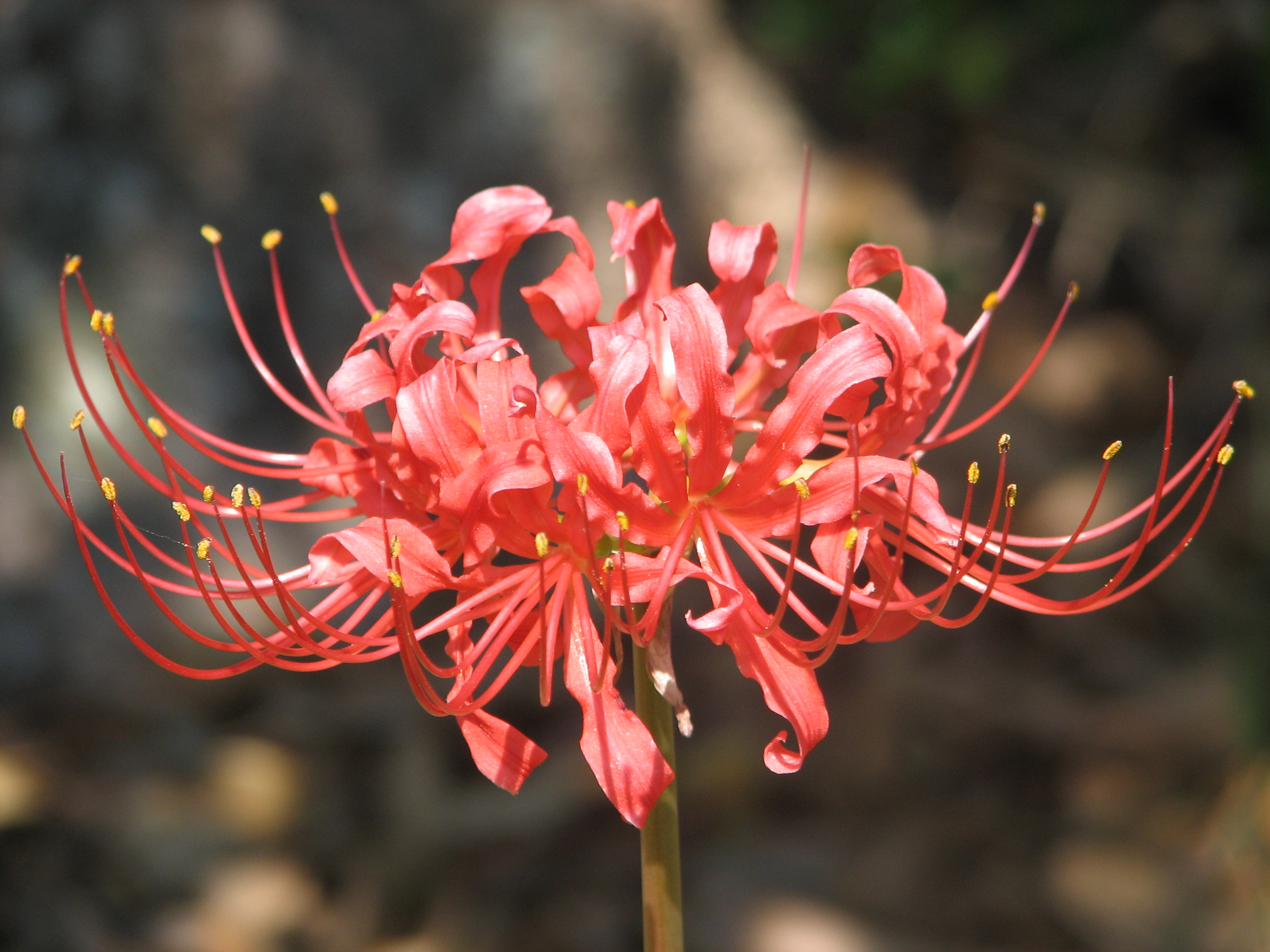
Red spider lily
Red Spider Lily Care Tips. Origin: China. Height: Up to 24 in (60 cm) Light: Bright light. Give the plant a quarter turn every few days to ensure all sides receive sunlight for even growth. Water: Water thoroughly while plant is growing and blooming. Use a pot with a drainage hole and empty drainage tray because these bulbs may rot if kept wet.

Lycoris radiata (Red Spider Lily) K. van Bourgondien
Red spider lily Lycoris radiata has a bit of an ominous reputation. In Japan, it is believed to be a flower of the afterlife. They are planted at the tombs of ancestors, and believed to help guide a soul into their next incarnation. Spooky stories abound. So too do the myriad of names it's known by.

Red spider lily lycoris radiata cluster amaryllis higanbana flow Photograph by Alex Grichenko
Pack of 1 Lycoris Red (Lycoris radiata) has large iridescent red flowers with reflexed petals and long curving stamens in Autumn. Lycoris have a few common names; Spider Lily, Hurricane Lily and Cluster Amaryllis are just a few.

Red Lycoris Bulb,Spider Lily,Lycoris Radiata 5 Bulbs Bulbs, Roots & Rhizomes
Red Spider Lily Care When selecting a location for red spider lilies, make sure it will be permanent because the plants do not like to be moved. Plant the bulbs so that the necks rise just above ground level, spaced 6 to 12 inches apart. Avoid fully burying the bulbs, as this can affect the plant's ability to flower.
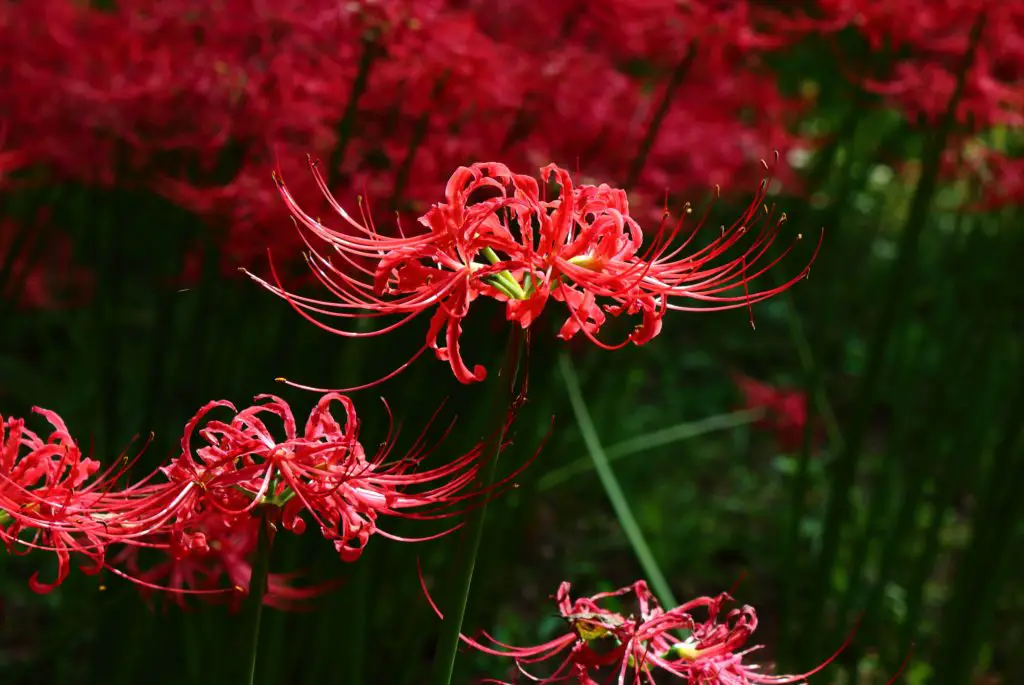
Red Spider Lily (Lycoris) Facts, Meaning and Symbolism A to Z Flowers
Red spider lily, also known as Lycoris radiata, hurricane lily, surprise lily, equinox flower belongs to the amaryllis Family. Red spider lilies are popularized in Southern United states and are native to Asian countries. They can reach to height of 40-70 cm (15-28 inches) tall and 1.5 ft wide and are thriving perennials.

(2) Red Spider Lily, Lycoris Radiata Bulbs, Beautiful Flowers, Fresh Easy to grow
What is Lycoris? Lycoris has a few common names; Spider Lily, Hurricane Lily and Cluster Amayllis are just a few. Lycoris aurea (Yellow flower) Lycoris radiata (Red flower) comes from the Amaryllidaceae family and originates from China. Lycoris is a bulbous perennial with a clumping habit.